新英语视听说音频使用说明
环球英语教程视听教程介绍

环球英语教程视听教程介绍第一篇:环球英语教程视听教程介绍《环球英语教程·视听教程》教你如何看电影学英语很多学习者都知道英语国家的原版电影是很好的语言学习资源,但却往往没好好利用这一资源,经常一部片子看下来就注意中文字幕了,没听懂几句英语,更别说学到什么有用的单词或者表达法了。
那么,是否有一定办法可以帮助学习者掌握方法,提高水平,从而打开这个资源丰富的宝藏呢?这里就简单介绍一套精心制作的英语教学片和它的使用方法。
《环球英语教程·视听教程》是一套专门为英语学习拍摄的教学片,并配有对应的纸质教材,它既可以用于自学,也可以用于课堂教学。
其目标是培养学习者掌握流利的日常英语会话。
教学片分两大部分,第一部分City Living的整体风格模仿著名的情景喜剧Friends,以6个来自世界各地的年轻人在纽约的学习、生活经历为线索展开故事情节,第二部分Global Viewpoints则是对世界各地人们的简短采访。
作为一部英语教学片,它既有影片的特点,就是生动、有趣、富于故事情节,能激发人的兴趣;又有英语教学的特点,就是依托教学理论,注重对语言现象的展示、复现、归纳等等。
而配套的纸质教材则是体现其教学理念的重要载体。
City Living部分影片是一段段的情景剧,对应纸质教材每个单元分4个板块,一开始先进行“预览(Preview)”,通过展示影片截图,进行相应练习,让学习者先对故事的整体有一个概念。
接下来是“片前预热(Before You Watch)”,主要通过练习,结合图片,对片中将出现的重要词汇进行预热。
第三部分“看片练习(While You Watch)”,则对影片内容理解、语言现象的掌握进行考察和练习。
第四部分“片后练习(After You Watch)”则重点对词汇、句型、表达法等语言知识进行深入学习与巩固。
Global Viewpoints纸质教材部分则分2个板块,“片前预热(Before You Watch)”和“看片练习(While You Watch)”,设计理念与前一部分类似,主要侧重于观点的表达与理解。
新实用英语视听说教程第1册最新版教学课件内置音视频U1 (下)
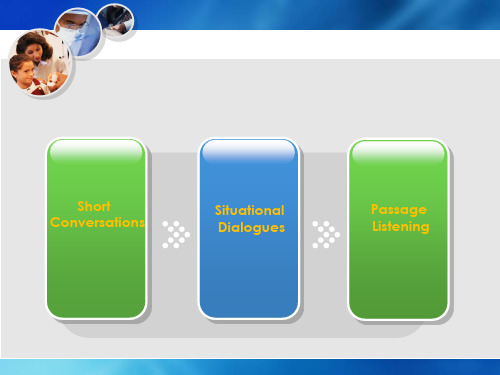
Passage Listening
2. Directions: Listen to the passage again and answer the following questions in brief. (1) When was handshaking first introduced into China?
D. To see Mr. Johnson off.
5. Where is Mr. Johnson now?
A. He’s in New York. B. He’s in Guangzhou.
✓C. He’s in Beijing. D. He’s in Tianjin.
Passage Listening
4. A: I’m ___s_o_h_a_p_p_y_ to meet you today. B: I’m ___re_a_l_ly happy we met too.
5. A: Hi, I’m Mick Harrison. B: __N_ic_e__to__m_e_e_t_y_o_u__. I’m Jack Lewis.
B. To give his thanks to Peter’s family. C. To send his thanks to Peter’s girl friend. D. To give his regards to Peter’s girl friend.
新视野视听说操作指南

新视野视听说软件操作指南I.进入“新视野视听说”学习界面在“用户名”一栏输入学号,原始密码也为学号。
II.点击红色字体“视听说教程1”III. 进入学习界面后点击Unit 1IV. 进入第一单元学习1.点击视频播放键,观看视频,了解本单元学习重点。
2.点击红色字体进入第一部分学习。
①点击左侧视频播放键,观看视频,收听问题。
可点击屏幕下方按钮使视屏最大化。
键。
点击播放键或按键均能听到自己所回答的内容。
如需更改,点击上交答案,也可点击键将答案保存后以e-mail形式发送给老师。
③可点击红色字体得到问题的文字记录。
完成回答练习后,可点击参考答案()中红色字体听到参考答案,点击看到参考答案的文字记录。
④在答题过程中,如需记录,可在区域进行记录,点击保存,点击清除记录内容。
⑤点击键进入下一题。
5题全部完成后点击最后的键进入下个部分的学习。
3.进入Listening Skills 部分学习①点击左侧音频播放键,听对话。
点击音频下方键以正常语速收听录音,点击键以较慢语速收听录音。
②双击划线部分,出现光标后打字,根据对话内容填空。
③点击键上交答案。
④在答题过程中,如需记录,可在区域进行记录,点击保存,点击清除记录内容。
⑤点击键进入下一题。
5题全部完成后,点击最后的按键,进入下个部分的练习。
4.进入Listening in 部分的学习第一小题:①点击左侧音频播放键,听对话。
点击音频下方键以正常语速收听录音,点击键以较慢语速收听录音。
②根据所听到的内容选择恰当的选项将句子补充完整。
用鼠标点击所选中句子前面的选择钮,选中后状态为③点击键上交答案。
④在答题过程中,如需记录,可在区域进行记录,点击保存,点击清除记录内容。
点击键进入下一题第二小题:①点击左侧音频播放键,收听对话。
点击音频下方键以正常语速收听录音,点击键以较慢语速收听录音。
②根据对话回答问题。
在答案框中双击鼠标左键,看到光标后将答案打入答案框。
③5个问题回答完毕后,可点击红色字体看到答案提示,点击听到答案提示。
新标准大学英语视听说教程1原文
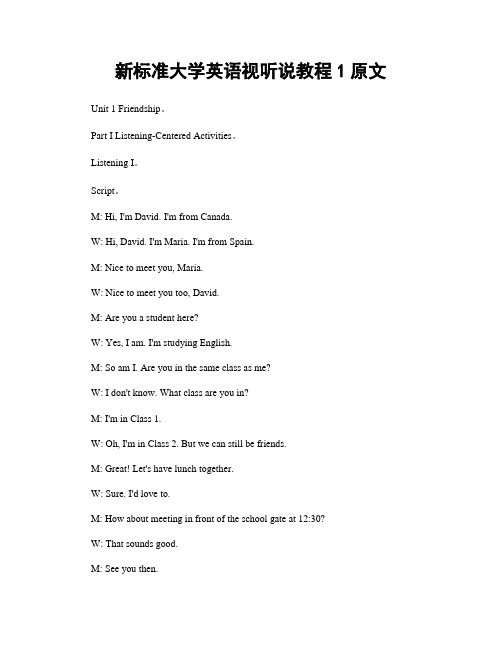
新标准大学英语视听说教程1原文Unit 1 Friendship。
Part I Listening-Centered Activities。
Listening I。
Script。
M: Hi, I'm David. I'm from Canada.W: Hi, David. I'm Maria. I'm from Spain.M: Nice to meet you, Maria.W: Nice to meet you too, David.M: Are you a student here?W: Yes, I am. I'm studying English.M: So am I. Are you in the same class as me?W: I don't know. What class are you in?M: I'm in Class 1.W: Oh, I'm in Class 2. But we can still be friends.M: Great! Let's have lunch together.W: Sure. I'd love to.M: How about meeting in front of the school gate at 12:30?W: That sounds good.M: See you then.W: See you.Listening II。
Script。
M: Hi, I'm Tom. I'm from Australia.W: Hi, Tom. I'm Linda. I'm from the UK.M: Nice to meet you, Linda.W: Nice to meet you too, Tom.M: Are you a student here?W: Yes, I am. I'm studying English.M: So am I. What class are you in?W: I'm in Class 2.M: Oh, I'm in Class 1. But we can still be friends.W: Great! Let's have lunch together.M: Sure. I'd love to.W: How about meeting in front of the school gate at 12:30? M: That sounds good.W: See you then.M: See you.Part II Speaking-Centered Activities。
全新版大学英语视听说教程1(全)

全新版⼤学英语视听说教程1(全)全新版⼤学英语视听说教程1U1ListeningA:1、Answers will vary. . He is picking an asparagus plant;he is a farmer.)2、Answers will vary. . Some people have too much rain;other people do not have enough water.3、Answers will vary.C:1、crucial2、resources3、huge4、on average5、conserve6、requires7、cut8、leak9、wastes10、statisticsD:1、C2、BC3、BE:1、70 22、billion3、9 billion4、1,7995、3,000 13F:1、water brush your teeth2、shorter showers3、meat4、leaky faucetsExtended ListeningExercise A:1、C2、B3、D4、CExercise B:S2: 6、20、25、80S3:put off、dripping、leaky、leave、brushing your teeth、shorter showers、laundry Exercise C:1、C2、B3、B4、A5、AExercise D:wastefula、leave the lights onb、drink half of itc、go badExercise E:3 2 1 4Exercise F:1、D2、B3、AExercise G:1、362、140,0003、 3 17Exercise H:1、B2、A3、B1、agreement world greenhouse emissions2、February 20053、air conditioning jackets and ties4、carbon emissionsSpeakingExercise D:serv nough tis leak cent la get wastTEDTalksC. Vocabulary:1—5:CBBAB6—10:CAACBD. Watch for Main Ideas:4E. Watch for Details:Segment 11、B2、A3、C4、ASegment 2I:You should follow two steps to use a paper towel correctly. A:ShakeB:FoldF. Expand Your Vocabulary:1、B2、A3、A4、BSelf-test1—5:BADAB6—10:DACCB1—5:CADCA6—10:BDDCCA. Communicate:1、Answers will vary. . Africa, east Africa, Tanzania and Kenya2、Answers will vary. . A cheetah is chasing a wildebeest in the Serengeti National Park.3、Answers will vary. . a trip to see animals in their natural habitatB. Think Critically1、photo safari.2、Awesome3、His reasons for going on a safariC. Vocabulary1、cycle2、essential3、a couple of4、motivation5、chases6、illegally7、landscape8、endangered9、extinct10、conservationD. Listen for Main Ideas1、BD2、4-3-1-2E. Listen for Details1、F2、T3、F4、T5、F6、F7、T1、B2、C3、A4、C5、BExtended Listening Exercise A1、B2、C3、DExercise B1、F2、T3、F4、T5、TExercise C1、C2、D3、AExercise D1、low carbon footprint2、environment3、incredible diversityExercise E1、C2、B3、DExercise F1、June 152、NANPA3、20064、outdoors camera interest hills cliffs Park Exercise G2、D3、BExercise H1、a school2、an organization3、a person4、a workshop5、a lakeSpeakingExercise A1、A professional guide.2、They had seven seats.3、In tents, in a camp.4、Female lions5、In the middle of the road6、Lying, sleeping.7、About 10 feet away8、For about 15 minutes.TEDTalksD. Vocabulary1–5:ABACB6—10:ACBBCWatchE. Watch for Main Ideas3F. Watch for Details1、=2、→→3、spctclr 2% ↑m ↑ftH. Watch for Details1 、giant super grapefruit spectacular2、tactile warm charged turquoise straightI. Expand Your Vocabulary1、B after a while2、A I’m just kidding3、A small-scale versionSelf-test1–5: ADCAB6—10:DBCCC1—5: CADDB6–10:DACCAU3ListeningA. Communicate1、Answers will vary. . The photo shows a lot of trafficin a city. It was taken in Xiamen, China.2、Answers will vary. . traffic, long commutes, difficultyparking, accidents3、Answers will varyB. CommunicateAnswers will vary. . The speaker says that cars are not very eco-friendly. Alternative methods of transportation are different ways to travel that are better fo r the environment. An example is riding a bike.C. Vocabulary1、g2、d3、c4、a6、e7、b8、f9、I10、hD. Listen for Main Ideas1、To begin cable car (Mi Teleférico)2、I’m going to present e-bikes (electric bicycles)3、My topic today is electric microcarsE. Listen for DetailsProblems w / travel to / from El Alto & La Paz:dangerousnoisetrafficpollutionBenefits of Mi Teleférico system:convenientcheapeco-friendlyF. Listen for Details1、1,5002、20-303、a penny 1,0004、185、15Exercise G1、T2、F3、T4、T5、FExtended ListeningExercise A2、D3、C4、AExercise B1、F2、F3、TExercise C1、In 20102、Two3、They could communicate with each other and pass each other safely4、General Motors and Shanghai Jiao Tong University.5、Two years.Exercise D1、A3、A4、AExercise EAdvantages of regenerative brakes:1、converted stored used2、wear and tearAdvantages of smart sensors:1、safer2、delays3、passengersAdvantages of magnetic levitation:1、silently2、pollutantsExercise F1、C2、B3、DExercise G1、electric vehicle owners place charge2:a、full battery coverb、Electrify batteriesExercise H1、C2、B3、BExercise I1、2002、Their energy consumption and CO?emissions by 50%.3、Electricity4、It can emit between 20 to 35% less carbon per passenger mileTEDTalks。
大学英语视听说课程实训手册音频文稿3B3U1-U4

《大学英语视听说课程实训手册第3册》音频文稿Unit 5 The Power of ArtsLesson OneAudio StudioTask 1Identifying the GistListen to the audio clip, and choose the right answers to the questions.Task 2Checking the FactsListen to the audio clip again and fill in the blanks according to what you have heard. Repeat the sentences after you have completed them.Lesson TwoAudio StudioTask 1Identifying the GistListen to the audio clip, and choose the right answers to questions.Task 2Checking the FactsListen to the audio clip again, and answer the following questions.Unit 6 Is Tourism a Mixed Blessing?Lesson OneAudio StudioTask 1Identifying the GistListen to the audio clip, and choose the right answers to the questions.Task 2Checking the FactsListen to the audio clip again and fill in the blanks according to what you have heard. Repeat the sentences after you have completed them.Lesson TwoAudio StudioTask 1Identifying the GistListen to the audio clip, and choose the right answers to the questions. Task 2Checking Your ComprehensionListen to the audio clip again, and answer the following questions.Unit 7 Internet AddictionLesson OneAudio StudioTask 1Identifying the GistListen to the audio clip, and choose the right answers to the questions.Task 2Checking the FactsListen to the audio clip again and fill in the blanks according to what you have heard. Repeat the sentences after you have completed them.Lesson TwoAudio StudioTask 1Identifying the GistListen to the audio clip, and choose the right answers to the questions.Task 2Checking the FactsListen to the audio clip again and fill in the blanks according to what you have heard.Unit 8 A Better Way to Fight PovertyLesson OneAudio StudioTask 1Identifying the GistListen to the audio clip, and choose the right answers to the questions.Task 2Checking the FactsListen to the audio clip again and fill in the blanks according to what you have heard. Repeat the sentences after you have completed them.Lesson Two Audio StudioTask 1Identifying the GistListen to the audio clip, and choose the right answers to the questions. Task 2Checking the FactsListen to the audio clip again, and answer the following questions.。
新标准大学准英语视听说教程(1)Conversation听力原文
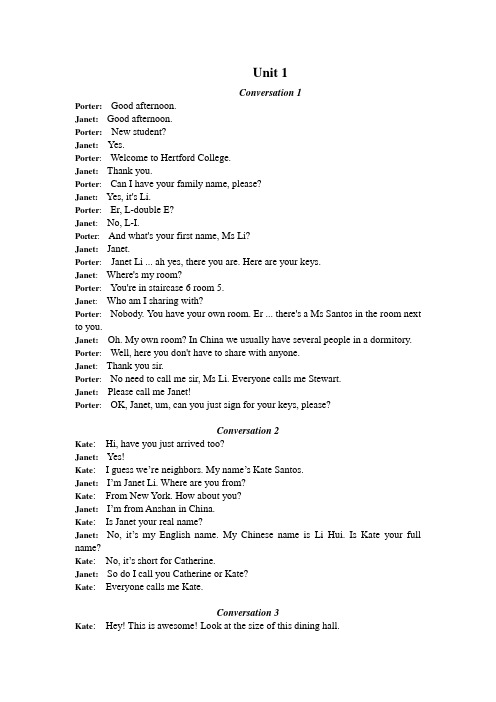
Unit 1Conversation 1Porter: Good afternoon.Janet: Good afternoon.Porter:New student?Janet:Yes.Porter: Welcome to Hertford College.Janet: Thank you.Porter: Can I have your family name, please?Jane t: Yes, it's Li.Porter: Er, L-double E?Janet: No, L-I.Po r te r: And what's your first name, Ms Li?Janet:Janet.Porter: Janet Li ... ah yes, there you are. Here are your keys.Janet: Where's my room?Porter: You're in staircase 6 room 5.Jane t: Who am I sharing with?Porter: Nobody. You have your own room. Er ... there's a Ms Santos in the room next to you.Janet:Oh. My own room? In China we usually have several people in a dormitory. Porter: Well, here you don't have to share with anyone.Janet: Thank you sir.Porter: No need to call me sir, Ms Li. Everyone calls me Stewart.Janet: Please call me Janet!Porter: OK, Janet, um, can you just sign for your keys, please?Conversation 2Kate: Hi, have you just arrived too?Janet: Yes!Kate: I guess we’re neighbors. My name’s Kate Santos.Janet: I’m Janet Li. Where are you from?Kate: From New York. How about you?Janet: I’m from Anshan in China.Kate: Is Janet your real name?Janet: No, it’s my English name. My Chinese name is Li Hui. Is Kate your full name?Kate: No, it’s short for Catherine.Janet: So do I call you Catherine or Kate?Kate: Everyone calls me Kate.Conversation 3Kate: Hey! This is awesome! Look at the size of this dining hall.Janet: Is this where we have all our meals?Kate: I guess.Mark: You just arrived?Girls:Yes!Mark: Me too. By the way, I’m Mark. Nice to meet you.Kate: Hi, I’m Kate.Mark: Hi, Kate, I guess you’re from the States.Kate: Right. How can you tell? You’re British, huh?Mark: Yes, I’m from London. And you are …?Janet: I’m Li Hui. I’m from China. But you can call me Janet.Mark: Hi Janet. Welcome to England. What are you reading?Janet: English.Mark: How about you, Kate?Kate: My major is law. And you?Mark: I’m studying PPE.Kate: That’s a special Oxford subject, isn’t it?Unit 2Conversation 1Kate: Oh, this looks nice.Mark: Cool.Waitress: Good afternoon, table for three? Come this way.Mark: Let's have a look at the menu.Mark: Thank you.Janet: Thank you.Waitress: The specials are on the board.Kate: So, what sorts of food do you like, Janet?Janet: Well, I like spicy food. And I'm not very fond of raw food! What would you recommend?Mark: Why don't you try the chicken curry? That's nice and spicy.Janet: What's in it?Mark: Chicken cooked in tomatoes and onions with Indian spices.Janet: I'll try it. Do we all choose a selection of dishes to share or only one dish per person?Mark: Usually one dish per person.Kate: Or the moussaka looks good.Janet: What's it made with?Kate: It's made with lamb and eggplant. It's a Greek dish.Janet: How is it cooked?Kate: It's baked in the oven.Janet: Mm, that sounds good too.Kate: And as a starter?Janet: What's minestrone soup?Mark: It's an Italian soup with vegetables and pasta. It's delicious!Janet: OK, I'll have that.Kate: Waitress?Waitress: What can I get for you?Kate: Well, for the starter, can we have two minestrone soups, and for the main course, one moussaka and one curry, please. What about you, Mark?Mark: I'll have the prawns with garlic and the chilli con carne. And could you bring us some water, please?Waitress: OK.Mark: Thank you.Waitress: Thanks.Janet: What's chilli con carne?Mark: It's a spicy Mexican dish with beef and beans. It's very hot!Conversation 2Janet: That was great! Except I don't like cold water. I usually drink hot water. Kate: Hot water? We never drink hot water except with tea. Let's have a dessert. What would you like, Janet?Janet: Any suggestions?Kate: Well, why don't you try the apple strudel? It's an Austrian dish. It's made with apple, pastry and spices.Janet: No, I'm not so keen on pastry. ...What's a chocolate brownie?Mark: It's a kind of chocolate cake.Janet: How is it made?Kate: It's made with flour, eggs and butter...Mark: And lots of chocolate!Kate: You'll love it.Janet: What kind of ice cream is there?Kate: I'll ask ... Excuse me ... What flavor ice cream do you have?Waitress: Strawberry, vanilla and chocolate.Janet: I'll just have a fruit salad, I think.Mark: And Kate, what are you going to have?Kate: Same for me.Mark: Could you bring us two fruit salads, and a chocolate brownie?Waitress: Sure.Unit 3Conversation 1Mark: Hi, what're you doing?Janet: Oh, nothing much ... Well, I'm just doing this quiz here in the newspaper. Mark: Let's have a look then.Janet: Here. It's called, "How much do you know about memory?" I've just done it.Do you want to have a go?Mark: OK, might as well. I'm not busy.Janet: Right. Look, I'll read the statements. Then you have to answer "true" or "false". Ready?Mark: Yea.Janet: OK. Physical exercise improves your memory. True or false?Mark: True, I suppose. It sounds like the right answer.Janet: You're right; exercise does improve your memory. Next statement: 30 per cent of people have a visual memory.Mark: That sounds about right. True?Janet: No, wrong, I'm afraid. In fact, 60 per cent of people have a visual memory. Mark: Really? Actually, I've got a pretty good memory.Janet: Have you? OK ... Next one ... When you're tired, it's more difficult to remember things.Mark: That's true, obviously. I can't remember a thing when I'm tired.Janet: Correct! If you do one activity for a long time, your memory will improve. Mark: I'm not sure ... True?Janet: Actually, it's false.Mark: Oh!Janet: Eating fruit and vegetables can improve your memory.Mark: I read something in The Times about that. True.Janet: True, it says here.Mark: Oh, no! I've got a lecture. I'd forgotten. I'd better get going!Janet: Oh, Mark! What a good memory you have!Conversation 2Kate: You're looking a bit down, Janet. What's up?Janet: Well ... I'm finding studying at Oxford quite hard.Kate: You're telling me! There's so much work!Janet: It's not the amount of work, but everything's so different. In China, generally we have large classes, we don't have tutorials. And mostly, our teacher tells us what we should do. So I'm not used to asking questions or discussing things. I find it difficult.Kate: You have to memorize a lot, don't you?Janet: Yes, but I'm good at that.Kate: You're lucky. There's so much to remember studying law! I have difficulty sometimes, I really do.Janet: Yes, well, we've been trained to do that. But we don't have so much training in critical thinking.Kate: What do you mean by critical thinking?Janet: Let me think ... I think it's giving your opinion and then justifying it.Kate: Yes, I suppose that's what our teachers have always encouraged us to do. Janet: I am getting better at it, I suppose.Kate: Hey! How about this? Let's pretend I'm your tutor. I'll make a statement. Yourtask is to examine it and then ask questions.Janet: OK.Kate: Everyone is capable of learning a second language. Go on, ask a question! Janet: Why do you say that?Kate: That's what the research tells us. Now ask another one.Janet: Can you give an example of some research?Kate: Um ... No! Look, I'm starving and I can't think at all when I'm hungry.Unit 4Conversation 1Kate: Oh, I must make a quick call. ...Jacky: Hello, Jacky Gordon speaking.Kate: Hello, can I speak to Abbie, please?Jacky: I'll see if she's in, can you hold on?Kate: Sure. ...Jacky: Hello? She's out, I'm afraid. Can I give her a message — er ... or I can ask her to call you back?Kate: Could you ask her to call me back?Jacky: Sure. Who's calling?Kate: Kate Santos.Jacky: Kate Santos, OK. Does Abbie have your number?Kate: Yes, she does.Jacky: I'll tell her you called.Kate: Thanks.Janet: Abbie? I know a girl called Abbie. She reads English, doesn't she?Kate: Yes, how do you know her?Janet: She has a tutorial just after me so we chat a bit. We get on really well. Kate: Yes, everyone likes Abbie. I think it's because she's really interested in people — she's a very good listener. She should be, she works for Nightline.Janet: Nightline?Kate: Oh, I haven't told you, I've joined it.Janet: What is it? I've never heard of it.Kate: Look, I've got a leaflet about it.Janet: So...Kate: It's a university helpline for students who are having problems. I'm training to be one of the people they can call to talk to.Janet: You mean, you're a volunteer?Kate: Yes.Janet: Oh, that's great, KateConversation 2Abbie: Hi, Abbie speaking.Kate: Hi, Abbie, it's Kate Santos.Abbie: Hi! I'm sorry not to have called you back. I've got a lot on at the moment. How's things?Kate: Fine. I just wanted to let you know I won't be able to come to the next training session.Abbie: Um ... It's quite an important session. Oh, can you hold on a moment. There's someone at the door. ...Abbie: Hi, I'm sorry, look, can I call you back later?Kate: Sure. What time?Abbie: Is three o'clock OK?Kate: Three's fine.Abbie: OK, I'll call you then. Speak soon.Kate: Bye.Abbie: Bye....Kate: Abbie's my Nightline trainer.Janet: You're saying she's your Nightline trainer! But she's still a student.Kate: Well, experienced students train new students, that's the way it works. Janet: Oh, I see.Kate: It's great! At the moment, she's training us in listening skills.Janet: Listening skills? What do you mean, listening skills?Kate: Um ... The ability to really listen to someone and make them feel you're listening. It's very important.Janet: I've never thought about that before.Kate: Yes, for example, one thing you can do is listen carefully and then repeat what someone says but maybe a little differently.Janet: So what you're saying is, repeat what someone says but maybe not the exact same words.Kate: Yes. You see, when you do that, you check you've understood and you show them you're really listening.Janet: So they know you've really heard them.Kate: Very good, Janet. I can see you've got it already! Hi ... how's it going?Unit 5Conversation 1Kate: Hi, Becky, how's it going?Becky: Good!Mark: Guys, look, can you help me with a problem?Janet: Yes, of course.Mark: The thing is, there's this girl I really like called Jenny Sparks. She's a Fresher, really stunning, reads history. I know her name because someone pointed her out to me, but I've never actually spoken to her. Do either of you know her?Kate: No.Janet: No, I don't know her. Mark, how can you like her if you haven't met her? Kate: It's because she's absolutely gorgeous, Janet.Mark: That's right! I want to ask her out, but first I've got to meet her. Got any suggestions?Becky: Guys! You want to order?Mark: Sorry.Kate: Three cappuccinos?Becky: Sure.Janet: Do you know anyone who knows her? You could ask them to introduce you. Mark: No, I don't, that's the problem.Kate: Are you matchmaking, Janet?Janet: What's matchmaking?Kate: Making introductions between people who might like each other. We don't do that here. How about just walking up to her and saying Hi? Why don't you do that? Mark: No.Kate: Why not?Mark: I'm not usually shy, but — she's so ... you know ...!Janet: Oh, Mark!Kate: Just believe in yourself, Mark. You're a great guy!Janet: I understand Mark completely.Kate: Well, it's the only way he's going to get to talk to her.Mark: OK, I'll give it a try.Becky: Solved the Jenny problem yet?Girls: Thank you.Janet: You'll be fine. Mark. She'll like him, won't she, Becky?Becky: Of course she will!Conversation 2Mark: Hey, guess what, guys, I've got a date with Jenny.Kate: You did it, you asked her out?Janet: When are you seeing her?Mark: Saturday. We're going to The Eagle and Child.Janet: Sounds great.Mark: Yeah! The thing is, I'm a bit nervous.Janet: Are you?Mark: Yes, I'm afraid I'll make a fool of myself. I could do with some more advice. Kate: Any ideas?Janet: Um ... I'm thinking.Kate: Well ... One thing is ... if you're nervous, it's easy to talk too much, so remember not to do that.Mark: Good point. I'll remember that.Janet: You should make her feel special. Show her you're really interested in her. Mark: I am really interested in her.Janet: Well, you should show her you are.Mark: That'll be easy! What else?Kate: It's a good idea to look good.Mark: That's pretty obvious!Kate: I mean clean clothes, Mark!Mark: Oh ... thanks, Kate! Any more advice?Kate: Yes, the most important thing is, just be yourself.Becky: How's it going, Mark?Kate: He's worried this girl won't like him.Becky: She'll love you! Ready to order?Unit 6Conversation 1Janet: So, are you looking for anything in particular?Mark: Maybe a T-shirt or a polo shirt.Janet: We could go into the covered market and have a look at the shops in there. Kate: And what about you?Janet: I need some cosmetics from the Body Shop on Corn market Street.Kate: And I'm looking for something to wear to Jenny's party tonight. But nothing too expensive. Anyway, look, let's go in here.Assistant: Can I help you?Kate: We're just looking.Mark: What do you think of this one?Kate: Hmm, it's OK, but I'm not sure green suits you. Do they have it in other colors?Janet: What size do you take?Mark: Medium, I guess. Oh, here's a nice polo shirt. I like the color. It's a bit small, though.Janet: Do they have it in a larger size?Mark: Yes, here we go. That's great.Janet: How much is it?Mark: Twelve pounds. That's not too bad. I'll buy it.Mark: I'll have this, please.Assistant: That'll be 12 pounds please. ... Thank you. ... And here's your shirt, and here's your receipt.Mark: Thanks.Mark: Look, I've really got to go. I'll see you at the party tonight.Kate: OK.Janet:Bye.Conversation 2Janet: OK, Kate. Now it is time to find something for you. What about this dress?Kate: Hey, that's lovely.Janet: Would you like to try it on?Kate: Yes, OK. Where are the changing rooms?Assistant: Just behind you.Kate: Thank you. ... What do you think?Janet: Well, it really suits you, but ...Kate: ... it's a bit big. Excuse me, do you have this in a smaller size?Assistant: What size do you take?Kate: Size 8, I think.Assistant: No, I'm afraid we don't. That's the last one.Kate: No, it doesn't really fit. OK, I'll leave it.Janet: Actually, I really like it.Kate: Why don't you try it on, then?Janet: OK. ... What do you think?Kate: Perfect. It really suits you.Janet: It's a bit expensive.Kate: Go on! You deserve it!Janet: OK, I'll have it. But I don't have enough cash. ... Can I pay by credit card? Assistant: Sure.Janet: Thank you.Assistant: Please enter your PIN. ... And here's your receipt.Janet: Thank you.Assistant: Thanks a lot.Kate: That was painless, wasn't it? But I still don't have a dress for the party. Let's try somewhere else.Assistant: Bye.Girls: Bye.Unit 7Conversation 1Janet: What time are your parents arriving?Kate: Eleven. Oh no, it's 10.30! I must clean up my room, it's a mess.Janet: Would you like me to give you a hand?Kate: Oh, yes, that would be great! ...Janet: So, what are they like, your parents?Kate: They're great. They're very different. Mum's pretty sociable — she's real funny. Dad isn't as sociable — he's kind of quiet — he reads a lot and he likes spending time alone. He's a lot more chilled than Mum.Janet: They do sound quite different.Kate: Yes. Mum — she tends to worry a lot, whereas Dad's quite ... easygoing. He's good at listening, you can tell him anything. Um ... could you put those over there? Janet: Sure. So who are you most like?Kate: You tell me!Janet: Hmm, you've got a bit of both of them, I think.Kate: Yes, I think so, too. I'm sociable, like Mum —Janet: You're very sociable!Kate: Yes, but I like to spend time alone.Janet: I don't think you worry a lot, do you?Kate: No, I'm like Dad in that way.Kate: Oh, look at the time, I must go. I'm meeting them outside the Lodge.Conversation 2Julia: This is great. It's just like I pictured it. Look at that, isn't it beautiful?Rob: Wow, Kate, honey! I love your school!Kate: No, Dad, I'm not at Law School, I'm at university!Rob: OK, honey. It's Oxford, England — I know! ...Rob: Listen, honey, Granddad had a fall just before we left.Kate: Oh, no!Rob: It's OK. He broke his arm but they don't think it's serious.Julia: I don't know, when old people break something, it can be very serious. Rob: I think he'll be fine!Kate: Tell me all about it. What exactly happened?Rob: He fell down the steps in the backyard.Kate: Oh, poor Granddad! So go on!Rob: He was taken to the hospital by ambulance ... they kept him there for several hours, didn't they, Julia? But they let him go home.Julia: I feel awful that we can't be with him.Rob: Julia, I spoke to Granddad as soon as we landed and he said the doctors aren't worried.Kate: What else did he say?Rob: He said his arm doesn't hurt him.Kate: Oh, good! So he'll be OK, right? There's no real concern?Rob: No, I told you, honey, there's no need to worry. ... Just look at that! What a great place!Kate: Yes, isn't it wonderful?Rob: Come on, let's go and eat. Isn't there a pub nearby? I seem to remember passing one. I'd love to eat in an English pub.Kate: OK, let's do that.Rob: There's no need to worry, honey.Unit 8Conversation 1Assistant: Hi, how can I help you?Mark: I'd like to book a flight and make a hotel reservation.Assistant: Going to ...?Mark: To New York, please.Assistant: Is that a one-way or a return?Mark: A return, please. Out on the 17th of June and coming back on the 10th of September.Assistant: OK, and I guess you want economy not club?Mark: Yes, economy, please. Could I have an aisle seat, not a window seat? Assistant: I'm afraid you'll have to do that at the airport. What about accommodation?Mark: Well, most of the time I'm working in upstate New York, but I need a cheap hotel in New York City and one in Boston for a few nights.Assistant: How many nights will you be staying?Mark: Three nights in Boston and two nights in New York. The 12th to the 15th of August in Boston, leaving on the 15th, so three nights in Boston. Then the 15th to the 17th in New York, leaving on the 17th. So two nights in New York.Assistant: OK, I can check that out for you. Single or double room?Mark: Single. With a shower, please.Assistant: I can get you rooms in budget hotels and motels for around 75 dollars a night.Mark: Does the price include breakfast?Assistant: Let me see. Yes, I can do that for you.Mark: What time is check-out?Assistant: Usually midday ... Do you have a student card? You'll need it for the cheap flights and the accommodation. Oh, and any travelling within the US? We can get you seats on Greyhound buses, if you want.Mark: Actually, that would be great. Can you get me a seat from New York to Boston, travelling on the 12th of August? And then one from New York to Chicago on the 17th? After Chicago I'm going to DC and then back to New York, but I'll get those tickets when I'm in the States.Assistant: No problem, just give me a few minutes ...Conversation 2Kate: Have you made plans for the summer vacation yet?Mark: Yes, I'm travelling around the States for three months.Janet: Three months! Wow, you're lucky! Whereabouts are you going?Mark: Well, I'm flying to New York City, and then I'm working for eight weeks as a counsellor on a summer camp in upstate New York. And then I'm travelling around for about four weeks, back in time for the start of term.Kate: Where are you staying?Mark: On the campsite in the mountains. It's about an hour away from New York City by bus.Kate: What are you going to do there?Mark: I'll be looking after teenagers, city kids mostly. We're going swimming, rafting and canoeing, and maybe backpacking in the mountains.Janet: That sounds amazing! And after that, what are your plans?Mark: I'll catch the Greyhound bus to Boston, and relax in a hotel for three days. Kate: The museums in Boston are great! You absolutely must visit them.Mark: OK, I'll do that. Then I go back to New York for two days, to watch a baseball game.Kate: The New York Yankees? That's my team!Mark: Then I'm flying to Chicago for six days, to stay with some friends.Kate: And will you fly home from Chicago?Mark: No, then I'll go to DC for six days to do some sightseeing. And then I'll be back a few days before the beginning of term.Janet: It sounds like a dream vacation.Unit 9Conversation 1Kate: Oh, Janet, you don't look too good. What's the matter?Janet: Oh, I'm OK. I am not sleeping very well at the moment, so I'm quite tired. I fell asleep in the lecture just now.Kate: Is anything wrong?Janet: Oh, I don't know. Maybe I'm worried about my end of term exams. And I've got an essay to write.Kate: Are you eating properly? I didn't see you at dinner last night.Janet: No, I've lost my appetite. I can't face any more Western food for a few days. Kate: I think you've lost some weight. Do you feel sick?Janet: Mostly homesick.Kate: Have you talked to your tutor?Janet: No! Why would I do that?Kate: Well, it's part of his job to keep an eye on your health. Why don't you make an appointment to see the doctor?Janet: But I'm all right.Kate: Do you have any other symptoms? Do you have a headache?Janet: Well, I have a headache nearly all the time at the moment. And I feel a bit depressed. But it's nothing. I'll be all right. Please! Don't worry about me.Kate: You poor thing! Why don't you make an appointment to see the doctor? She'll give you a check-up; take your temperature and blood pressure, all the usual tests. Janet: Oh, I don't want to make a fuss. It's nothing.Kate: You're not making a fuss. I am! And I'm coming with you.Conversation 2Doctor: What seems to be the problem?Janet: Well ...Kate: She hasn't been eating or sleeping properly. She fell asleep in the lecture this morning.Doctor: Hmm, and what did the lecturer think of that?Janet: Fortunately, he didn't see me.Doctor: OK, I'm going to ask you a few questions. How's your social life?Janet: It's fine. I've got some really nice friends.Doctor: Have you got a boyfriend?Janet: No. I don't think my parents would like me to have one while I'm at university.Doctor: And are you eating properly?Janet: Yes, I think so.Kate: She says she's a bit fed up with Western food.Doctor: OK, so you'd like some home comfort ... what's your favorite food? Janet: Fried rice!Doctor: Not much fried rice for dinner in college, is there? Um, any worries about your work?Janet: No. Maybe. Yes, I suppose so.Doctor: Do you have an essay crisis?Janet: Yes! I haven't finished all the reading. I don't read as quickly as my friends, so it takes me a long time to write my essays.Doctor: OK, Janet. I want you to try and take a few days off. I'll have a word with your tutor and see if he can wait for your essay.Janet: OK.Doctor: If you're run down or depressed, you're more likely to catch a cold. Can you come back and see me next week? In the meantime, I suggest you try taking some...Unit 10Conversation 1Janet: Hi!Mark: Hi!Kate: How are you?Mark: I'm OK, thanks. How're you guys?Kate: Good.Mark: Good ... Oh, that traffic! It's getting worse and worse!Kate: Tell me about it, it's awful! Don't you worry about your health when you're cycling? All that pollution! Like, what are we breathing in? They really should do something about it!Mark: I think they intend to — or at least they keep talking about it.Janet:Shall we go inside?Mark: Yea....Mark: You know, it sounds crazy, but it might be an idea to ban cars from the centre of the city. I nearly got hit by a crazy driver earlier.Kate: Are you OK?Mark: Yes, I'm fine.Janet: Would they really do that — ban cars?Mark: It's possible. It'd sort out the traffic problems. And it would reduce pollution. Janet: I don't think that would be very popular with drivers.Mark: But it would be safer for cyclists.Kate: Supposing they introduced a congestion charge?Mark: Like in London?Janet: Do you think it would stop people driving into Oxford?Mark: It'd stop some people.Kate: They could always extend the Park and Ride scheme.Janet: It's a good idea.Kate: If people actually use it.Mark: Hey, I haven't told you, I'm going to a meeting of the Environmental Action Group tonight.Kate: You are? Good for you!Mark: Yes, I'm just concerned about the environment. I've decided to get more active, believe it or not.Janet: I guess we all should.Kate: I know, you're right ... Excuse me ...Conversation 2Janet: By the way, Mark, how did your meeting go?Mark: Quite interesting, actually.Janet: So what did they talk about?Mark: Uh, recycling, mostly. They have this plan ... that everyone should write to the Council. Ask them to collect more rubbish. You know, like, all the plastic, which they don't do. I'm going to write a letter this evening.Janet: Really? You know, I think I might go to the next meeting. I've been meaning to do something ... get more active about the environment.Mark: Yes, we all need to. Global warming, ice caps melting, pollution. Doesn't it worry you?Janet: Yes, it's really frightening.Mark: Hey, it would be great if you came to the meeting, Janet. The Action Group really wants to make students more aware of what they can do to help.Janet: You know, I think everyone knows what they should do. But they don't do it — I don't do it.Mark: I'm the same. Actually, there's something we could do right now.Janet: What?Mark: There's this poster they want to put up all over the university. It tells you easy ways of saving energy. I'm looking at it, here, look ...Janet: "Use less hot water ..."Mark: They've asked us to print it out and put it up in college. You want to help me? Janet: Sure! It might be an idea to ask Kate to help.Mark: Yes, let's ask her. But why don't we print it out — right now?Janet: Sure.。
新时代实用英语视听说教程3

新时代实用英语视听说教程3New Practical English Audiovisual Speaking Course 3 in the New EraIntroduction:In the new era, as the world becomes more interconnected, the importance of English language skills has significantly increased. In response to this demand, the New Practical English Audiovisual Speaking Course 3 has been developed. This course aims to provide learners with comprehensive training in English listening, speaking, and pronunciation skills. It is designed to enhance the learners' communication abilities and empower them to navigate various real-life situations confidently. This article will discuss the key features and teaching methods employed in the New Practical English Audiovisual Speaking Course 3.Course Overview:The New Practical English Audiovisual Speaking Course 3 covers a wide range of topics that are relevant to learners in the modern world. It focuses on practical usage of the English language that is applicable in everyday life and professional settings. The course is divided into several modules, each addressing specific aspects of listening, speaking, and pronunciation skills.Module 1: Improving Listening SkillsThe first module of the course is dedicated to enhancing listening skills. Learners are exposed to a variety of audiovisual materials, including dialogues, interviews, and presentations. They are encouraged to activelylisten and comprehend the content while paying attention to pronunciation, intonation, and vocabulary usage. Through extensive practice, learners develop their ability to understand authentic English conversations and extract essential information accurately.Module 2: Developing Speaking SkillsThe second module focuses on developing speaking skills. Learners engage in interactive activities, such as role-plays, discussions, and presentations, to enhance their fluency and accuracy in spoken English. Emphasis is placed on developing clear articulation, appropriate use of expressions, and effective communication strategies. Through constant practice and feedback from instructors, learners gain confidence in expressing themselves in various situations, both formal and informal.Module 3: Mastering PronunciationThe third module is designed specifically to help learners master English pronunciation. Through the use of audiovisual materials and pronunciation exercises, learners are exposed to different phonetic sounds and patterns. They learn to differentiate between similar sounds, stress syllables correctly, and improve overall pronunciation clarity. Pronunciation drills and individual feedback enable learners to overcome specific challenges and develop a near-native accent.Teaching Methodology:The teaching methodology employed in the New Practical English Audiovisual Speaking Course 3 is learner-centered and communicative. It emphasizes active participation, interaction, and practical application oflanguage skills. The course incorporates a variety of teaching strategies, such as group discussions, pair work, and multimedia presentations, to engage learners and facilitate their language acquisition.Instructors, who are highly qualified and experienced in teaching English as a second language, create a supportive and inclusive learning environment. They provide personalized guidance and constructive feedback to help learners improve their skills effectively. Additionally, technology is integrated into the course, enabling learners to access online resources, practice listening exercises, and receive instant feedback on their pronunciation.Conclusion:The New Practical English Audiovisual Speaking Course 3 is a comprehensive and effective program for learners seeking to enhance their English language skills. Through its modules on improving listening skills, developing speaking skills, and mastering pronunciation, learners are equipped with the necessary tools to communicate confidently in various real-life contexts. The learner-centered approach, coupled with the expertise of instructors and incorporation of technology, ensures that learners not only acquire language skills but also develop a deep understanding of the English language. With the New Practical English Audiovisual Speaking Course 3, learners can embark on a successful journey towards becoming proficient English speakers in the new era.。
新实用英语视听说教程第1册最新版教学课件内置音视频U5
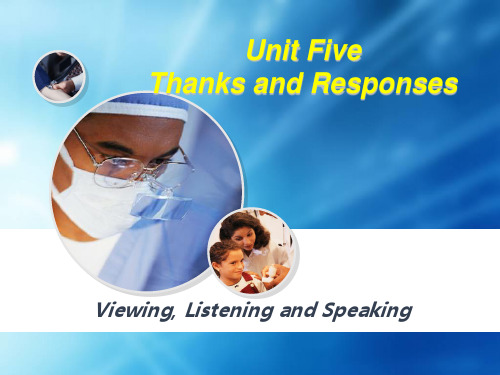
Jennifer: Hi. Eduardo. Nice to—
Eduardo: (2) It’s Eduardo. (3) E-D-U-A-R-D-O . Jennifer: Oh,ardo. (4) Sorry . It’s (5) nice to meet you.
✓A. To carry boxes. B. To carry bags. C. To show the way. D. To make two boxes.
2. Where can this conversation take place?
5. Sandra’s
.
✓A. dress is new B. shoes are new C. blouse is new D. pants are new
6. Sandra’s suitcase
.
✓ A. is in the taxi B. is not in the taxi C. is in the train D. is in the van
things. Sandra: Anne! Anne: WhTahte?y’re
Sandra: MyAgrelasses. (1)in
not here.
Anne: (2) I they (3) the bathroom?
Sandra: (4) hedreon’t know.
your
Anne: No, (5)
5. A: May I use your computer ? B: Yes, of course. But I need to do my homework 20 minutes later.
新视野视听说使用说明-学生版

单元框架
每个单元包含7个部分,视听结合,提高学生听说综合能力、培养跨文化意识。
Unit test 单元自测
自测部分包含四个板块,试题根 据教学目标有针对性地编写而成。 学习者在学习完本单元课程后, 通过自测可检验重点内容的掌握 情况。
单元框架
每个单元包含7个部分,视听结合,提高学生听说综合能力、培养跨文化意识。
更新个人信息
修改个人信息
班级注册
课程注册
班级名称/代号为:2014_班号 如:你是2014级1班的,则班级代号为2014_1,如此类推。
进入视听说学习平台
单元框架
每个单元包含7个部分,视听结合,提高学生听说综合能力、培养跨文化意识。
Lead-in 课程导入
根据单元主题不同,在课程导入 部分,学习者可以体验到各种不 同形式的短小、有趣的活动,以 此了解单元的主题和相关的重点 表达,从而更好地完成接下来的 听说任务。
本部分提供了与单元主题相关的 词汇与常用表达以及精彩的视频 片段,学习者可以在学习主课程 之余进行选择性浏览学习,强化 语言技能的训练并开拓视野。
Course resources 课程配套 资源
单元框架
每个单元包含7个部分,视听结合,提高学生听说综合能力、培养跨文化意识。
单元框架
每个单元包含7个部分,视听结合,提高学生听说综合能力、培养跨文化意识。 Further listening and speaking 听说拓展训练
本部分由听力和口语两个板块组 成,学习者通过听力和口语的拓 展练习,夯实课程中学习到的听 力技巧和口语技巧。
平台特色
( 4 ) 各类辅学资源。平台提供类型丰富的辅学资源,丰富课余活 动,寓教于乐。
全新版大学英语视听说教程1学生用书答案

全新版大学英语视听说教程1学生用书答案一、听力部分听力部分包括对话、短文、新闻、电影剪辑等,每段听力材料后都有5个问题,需学生在听完材料后进行回答。
对于学生而言,可以参照答案进行自我检查。
以下为部分答案示例:1、对话部分:问:What’s the main idea of the conversation?答:The man is not sure if he can get the job because there are other applicants who are more experienced.2、短文部分:问:What’s the main idea of the passage?答:The author discusses the importance of reading as a key to success in life and explains how reading can help us learn new skills, understand ourselves and the world better, and enjoy life more.3、新闻部分:问:What’s the main idea of the news?答:The news is about a new law that requires all businesses to provide employees with a minimum number of paid sick days each year.4、电影剪辑部分:问:What’s the main idea of the movie clip?答:The clip is from the movie “The Shawshank Redemption” and it shows how the main character, Andy Dufresne, manages to escape from Shawshank State Prison.二、视说部分视说部分包括角色扮演、英语原版电影片段等,旨在帮助学生提高口语表达能力。
新时代交互英语视听说1video show 文本
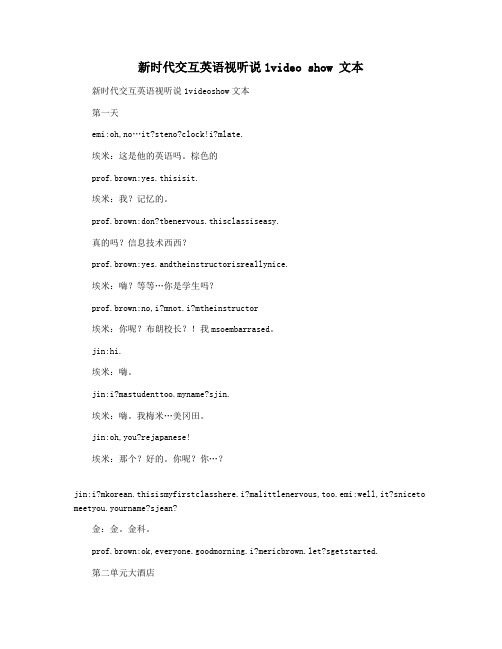
新时代交互英语视听说1video show 文本新时代交互英语视听说1videoshow文本第一天emi:oh,no…it?steno?clock!i?mlate.埃米:这是他的英语吗。
棕色的prof.brown:yes.thisisit.埃米:我?记忆的。
prof.brown:don?tbenervous.thisclassiseasy.真的吗?信息技术西西?prof.brown:yes.andtheinstructorisreallynice.埃米:嗨?等等…你是学生吗?prof.brown:no,i?mnot.i?mtheinstructor埃米:你呢?布朗校长?!我msoembarrased。
jin:hi.埃米:嗨。
jin:i?mastudenttoo.myname?sjin.埃米:嗨。
我梅米…美冈田。
jin:oh,you?rejapanese!埃米:那个?好的。
你呢?你…?jin:i?mkorean.thisismyfirstclasshere.i?malittlenervous,too.emi:well,it?sniceto meetyou.yourname?sjean?金:金。
金科。
prof.brown:ok,everyone.goodmorning.i?mericbrown.let?sgetstarted.第二单元大酒店kate:yes…ok.mm-hmmm.ok.goodbye.bye-bye.chris:goodmorning.凯特:早上好。
能帮你吗?chris:yes,ineedahotelreservation.凯特:好的。
什么城市?chris:newyork.manhattan.凯特:好的。
什么时候chris:nextweek.threenights.the7th,8th,and9th.凯特:好的。
允许塞伊。
威灵顿怎么样?优越的位置,宽敞的房间,美丽的景色。
信息技术Salittle很贵但是Verynice。
新实用英语视听说教程第一册第二版
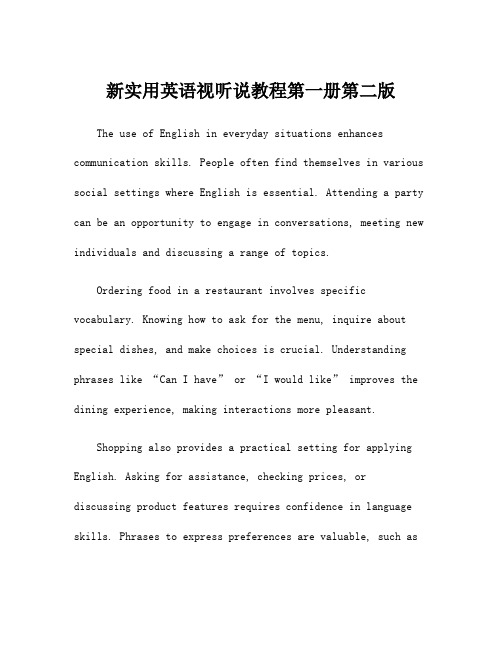
新实用英语视听说教程第一册第二版The use of English in everyday situations enhances communication skills. People often find themselves in various social settings where English is essential. Attending a party can be an opportunity to engage in conversations, meeting new individuals and discussing a range of topics.Ordering food in a restaurant involves specific vocabulary. Knowing how to ask for the menu, inquire about special dishes, and make choices is crucial. Understanding phrases like “Can I have” or “I would like” improves the dining experience, making interactions more pleasant.Shopping also provides a practical setting for applying English. Asking for assistance, checking prices, or discussing product features requires confidence in language skills. Phrases to express preferences are valuable, such as“Do you have this in another size?” or “Can you recommend something?”Traveling opens up new avenues for language use. Navigating airports, booking accommodations, and asking for directions are common activities. Mastery of travel-related vocabulary, including transportation methods and common landmarks, can make trips more enjoyable.In academic settings, participating in discussions or group projects helps build fluency. Expressing opinions, listening to others, and providing feedback are important skills. Engaging actively in classes promotes a deeper understanding of both language and subject matter.Workplace communication is also significant. Understanding job-related terminology and being able to articulate thoughts clearly are necessary for effective collaboration. Writing emails, making presentations, and conducting meetings require strong command of English.Practicing with friends can boost confidence. Role-playing different scenarios allows for a comfortable space to experiment with language. Listening to music, watching movies, or reading books in English provides exposure to various accents and expressions.Language learning is a continuous journey. Regularpractice not only enhances vocabulary but also fosters abetter grasp of grammar and pronunciation. Setting achievable goals can lead to steady improvement over time.Engaging in community activities can reinforce language skills. Volunteering or participating in local events encourages interaction with diverse groups. These experiences can enrich understanding of cultural nuances and expressions, making language use more meaningful.Ultimately, immersing oneself in English through various activities fosters a practical and enjoyable learning experience.。
新视野视听说操作指南

新视野视听说软件操作指南I.进入“新视野视听说”学习界面在“用户名”一栏输入学号,原始密码也为学号。
II.点击红色字体“视听说教程1”III. 进入学习界面后点击Unit 1IV. 进入第一单元学习1.点击视频播放键,观看视频,了解本单元学习重点。
2.点击红色字体进入第一部分学习。
①点击左侧视频播放键,观看视频,收听问题。
可点击屏幕下方按钮使视屏最大化。
键。
点击播放键或按键均能听到自己所回答的内容。
如需更改,点击上交答案,也可点击键将答案保存后以e-mail形式发送给老师。
③可点击红色字体得到问题的文字记录。
完成回答练习后,可点击参考答案()中红色字体听到参考答案,点击看到参考答案的文字记录。
④在答题过程中,如需记录,可在区域进行记录,点击保存,点击清除记录内容。
⑤点击键进入下一题。
5题全部完成后点击最后的键进入下个部分的学习。
3.进入Listening Skills 部分学习①点击左侧音频播放键,听对话。
点击音频下方键以正常语速收听录音,点击键以较慢语速收听录音。
②双击划线部分,出现光标后打字,根据对话内容填空。
③点击键上交答案。
④在答题过程中,如需记录,可在区域进行记录,点击保存,点击清除记录内容。
⑤点击键进入下一题。
5题全部完成后,点击最后的按键,进入下个部分的练习。
4.进入Listening in 部分的学习第一小题:①点击左侧音频播放键,听对话。
点击音频下方键以正常语速收听录音,点击键以较慢语速收听录音。
②根据所听到的内容选择恰当的选项将句子补充完整。
用鼠标点击所选中句子前面的选择钮,选中后状态为③点击键上交答案。
④在答题过程中,如需记录,可在区域进行记录,点击保存,点击清除记录内容。
点击键进入下一题第二小题:①点击左侧音频播放键,收听对话。
点击音频下方键以正常语速收听录音,点击键以较慢语速收听录音。
②根据对话回答问题。
在答案框中双击鼠标左键,看到光标后将答案打入答案框。
③5个问题回答完毕后,可点击红色字体看到答案提示,点击听到答案提示。
u校园新一代英语发展篇视听说教程
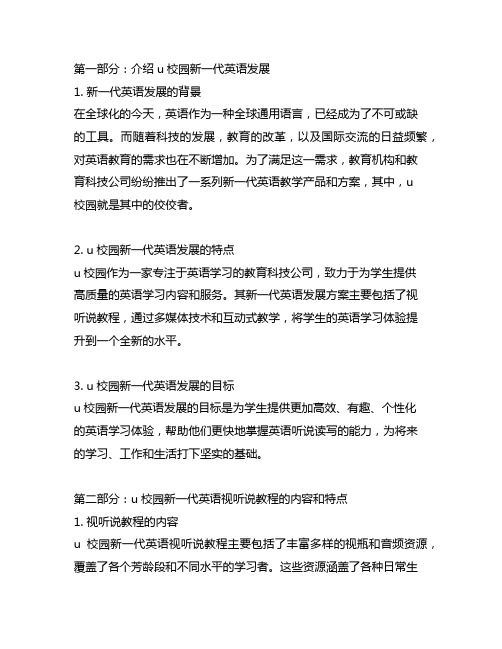
第一部分:介绍u校园新一代英语发展1. 新一代英语发展的背景在全球化的今天,英语作为一种全球通用语言,已经成为了不可或缺的工具。
而随着科技的发展,教育的改革,以及国际交流的日益频繁,对英语教育的需求也在不断增加。
为了满足这一需求,教育机构和教育科技公司纷纷推出了一系列新一代英语教学产品和方案,其中,u校园就是其中的佼佼者。
2. u校园新一代英语发展的特点u校园作为一家专注于英语学习的教育科技公司,致力于为学生提供高质量的英语学习内容和服务。
其新一代英语发展方案主要包括了视听说教程,通过多媒体技术和互动式教学,将学生的英语学习体验提升到一个全新的水平。
3. u校园新一代英语发展的目标u校园新一代英语发展的目标是为学生提供更加高效、有趣、个性化的英语学习体验,帮助他们更快地掌握英语听说读写的能力,为将来的学习、工作和生活打下坚实的基础。
第二部分:u校园新一代英语视听说教程的内容和特点1. 视听说教程的内容u校园新一代英语视听说教程主要包括了丰富多样的视瓶和音频资源,覆盖了各个芳龄段和不同水平的学习者。
这些资源涵盖了各种日常生活场景和话题,例如购物、旅行、工作等,帮助学生更好地了解和运用英语。
2. 视听说教程的特点u校园新一代英语视听说教程的独特之处在于其注重了互动式教学和个性化学习。
通过结合视瓶和音频资源,学生不仅可以通过视听方式来学习,还可以利用上线互动功能和智能学习系统进行练习和测试,提升学习效果。
3. 视听说教程的优势u校园新一代英语视听说教程相较于传统的书本教材和课堂教学,具有更强的吸引力和趣味性。
学生可以通过观看视瓶和听音频的方式来学习,模仿地道的口音和语调,培养自己的听力和口语能力,同时享受学习的乐趣。
第三部分:u校园新一代英语发展的案例分析1. u校园新一代英语发展在学校的应用许多学校在引入u校园新一代英语发展方案后,取得了显著的效果。
学生们对新的英语学习方式和内容产生了浓厚的兴趣,学习的效率和成绩也明显提高。
视听说第三版voice总结

视听说第三版voice总结篇一:视听说(Voice)是一套主要面向英语学习者的教材系列,其中的第三版是最新版本。
这个版本的教材致力于提高学生的英语听说能力,通过丰富多样的教学资源和互动活动,帮助学生在真实的语境中运用英语进行交流。
视听说第三版的教材内容丰富多样,包括了多种不同主题的话题,如日常生活、旅行、职业发展等。
教材中的听力材料包括了真实的对话、新闻报道、演讲等,帮助学生提高听力理解能力。
同时,教材还提供了丰富的口语练习材料,包括角色扮演、小组讨论、辩论等,帮助学生锻炼口语表达能力。
视听说第三版的教学资源丰富多样,包括教师用书、学生用书、配套音频和视频等。
教师用书为教师提供了详细的教学指导,包括教学目标、教学步骤和教学活动建议等。
学生用书提供了丰富的学习材料,包括听力和口语练习题目,帮助学生巩固所学知识。
配套的音频和视频资源可以帮助学生进行听力训练,同时提供了真实语境下的口语模仿。
除了教材资源,视听说第三版还提供了在线学习平台,学生可以通过该平台进行在线听力和口语练习。
平台上提供了丰富的听力材料和口语练习题目,并配备了自动打分系统,帮助学生自主学习和检测自己的听说能力。
总的来说,视听说第三版是一套专注于提高学生英语听说能力的教材系列。
通过多样化的教学资源和互动活动,帮助学生在真实的语境中进行英语交流,从而提升他们的英语水平。
篇二:视听说第三版是一套全新的英语教材,旨在帮助学生提高听说能力。
通过丰富的语言输入和口语练习,学生可以更好地理解和运用英语。
首先,视听说第三版注重提供大量的真实语言输入。
教材中包含了丰富多样的听力材料,如听力对话、新闻报道、访谈等,涵盖了各种不同的主题和语境。
学生可以通过这些听力材料提高对英语的理解能力,同时也能够更好地适应真实的英语交流环境。
其次,在口语练习方面,视听说第三版提供了大量的口语活动和会话练习。
学生可以通过与同学或老师的互动,进行各种有趣的口语练习,如角色扮演、演讲、辩论等。
学习软件使用手册(视听说)

《视听说》声明:1.本手册的内容如有更新,恕不另行通知,请以最新的电子版手册为准。
2.本手册的版权由清华大学出版社和电大在线远程教育技术有限公司共同拥有,任何其他单位和个人未经允许不得翻印。
目录第一部分简介 (3)1 学习软件介绍 (3)1.1 《新时代交互英语》简介 (3)1.2 学习软件的构成 (4)2 软件安装 (4)2.1 安装Media Player 9 (4)2.2 安装学习软件 (8)2.3 启动学习软件 (11)2.4 安装注意事项 (13)3 单元学习流程 (15)第二部分学习软件使用说明 (16)1 启动和进入 (16)1.1 过场动画 (16)1.2 登录界面 (16)1.3 进入系统 (17)1.4 信息说明 (18)1.5 学习软件激活操作说明 (19)2 辅助资源库 (23)2.1 PREFACE (25)2.2 MEET THE CHARACTERS (26)2.3 COURSE OUTLITE (27)2.4 DICTIONARY (27)2.5 GLOSSARY (28)2.6 GRAMMAR (29)2.7 PRONUNCIA TION (30)2.8 MOVIES (31)3 学习过程 (33)3.1 Goals (33)3.2 Watch the Video (34)3.3 Global Comprehension (35)3.4 Review (35)3.5 Say It Right (36)3.6 Repeat and Record (37)3.7 Record and Compare (38)3.8 Detailed Comprehension (39)3.9 Role Play (40)3.10 Pronunciation (41)3.11 More Listening (42)3.12 Apply (43)4 单元测试(Checkpoint) (44)4.1 简介 (44)4.2 测试 (44)5 单元报表(Unit Report) (48)6 Section Test (49)7 Level Test (49)第一部分简介1 学习软件介绍1.1 《新时代交互英语》简介为提高大学生英语综合应用能力,尤其是听说能力,清华大学出版社和电大在线远程教育技术有限公司精心设计开发了一套由“视听说”和“读写译”两大系列教学软件和立体化配套教材组成的《新时代交互英语》(New Era Interactive English)。
视听说教最新完整版

视听说教最新完整版视听说是一种非常有效的语言学习方法,通过结合视觉、听觉和口语表达,可以帮助学生更快地掌握语言技能。
以下是一个视听说教最新完整版的步骤和要点:1.教学目标和内容分析在开始设计视听说课程之前,教师需要明确教学目标和教学内容。
教学目标可以是学生能够听懂、说、读、写等语言技能的具体表现。
教学内容则是实现这些目标所需的相关语言知识和材料。
2.准备教学资源视听说教学需要使用多种教学资源,包括教材、音视频资料、图片、道具等。
教师需要根据教学内容和教学目标,准备相应的教学资源。
同时,教师还需要为学生准备一些学习材料,例如课本、练习册、PPT等。
3.设计教学环节视听说教学一般可以分为三个环节:听、说、练习。
(1)听听的环节主要是让学生通过听觉接触语言材料,教师可以选择一些适合学生水平的听力材料,例如对话、短文等。
教师可以在播放听力材料之前,先介绍一下背景知识和关键词,帮助学生理解听力内容。
(2)说说的环节主要是让学生通过口语表达来展示自己的语言技能。
教师可以选择一些适合学生水平的话题,例如日常对话、口头作文等。
教师可以先让学生进行小组讨论,然后让几个小组的学生在全班同学面前展示他们的口语表达。
(3)练习练习的环节主要是让学生通过实践活动来巩固和提高自己的语言技能。
教师可以设计一些有趣的练习活动,例如角色扮演、辩论等。
教师可以根据学生的表现情况进行点评和指导,帮助学生纠正发音、语法等问题。
4.组织课堂教学在组织课堂教学时,教师需要注意以下几点:(1)注重互动视听说教学需要师生之间、学生之间的互动。
教师可以通过组织小组讨论、角色扮演等活动来促进学生之间的交流和合作。
(2)注重实践视听说教学需要注重实践,教师可以在课堂上设计多种练习活动,让学生积极参与并进行语言实践。
(3)注重反馈教师需要及时了解学生的学习情况,并根据学生的表现情况进行点评和指导。
同时,教师还需要根据学生的反馈情况及时调整教学策略和内容。
